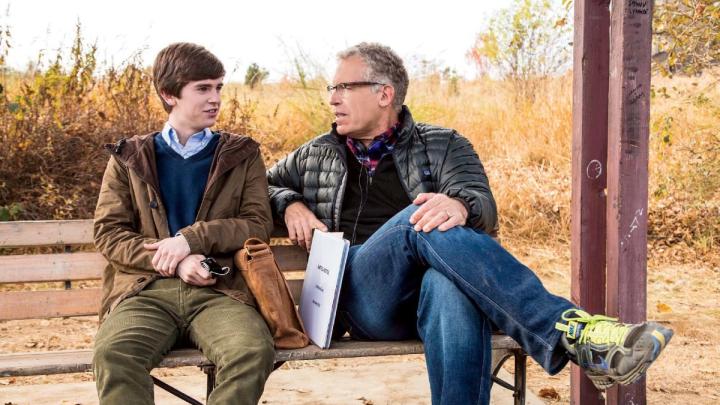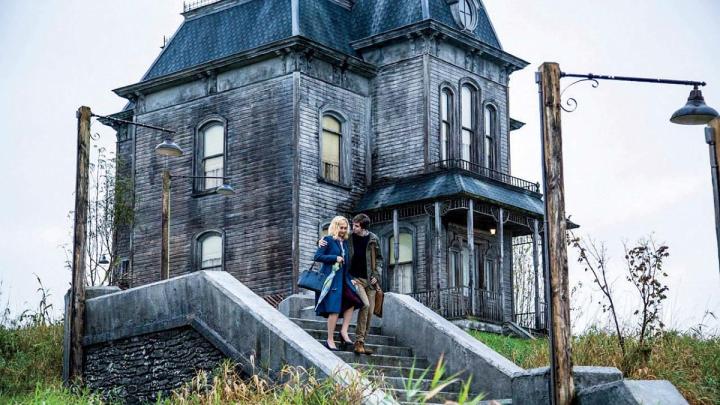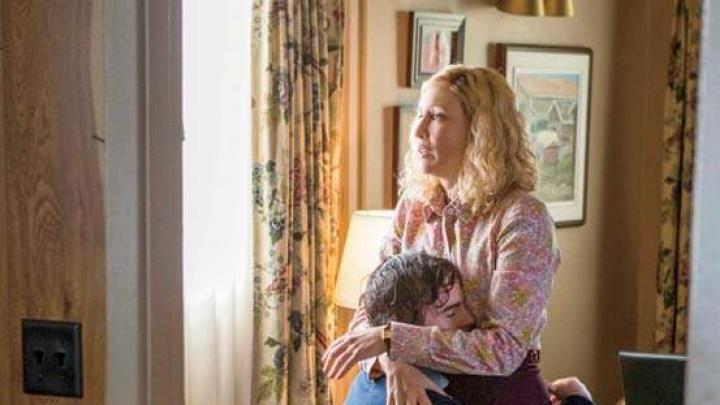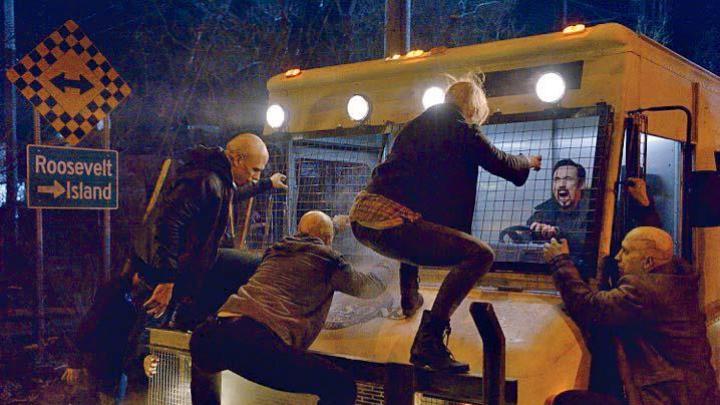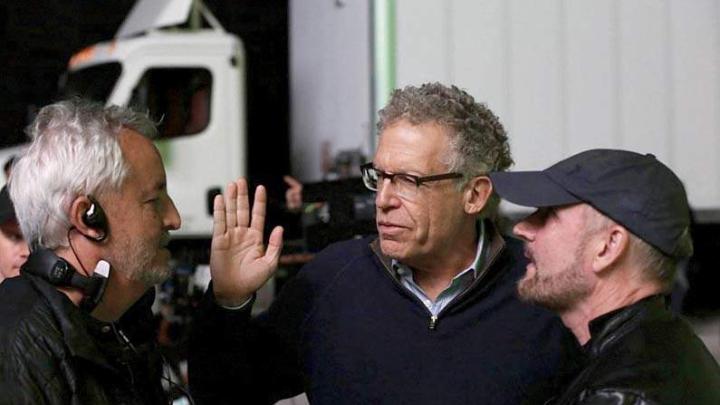When an idea keeps him up at night—nudges him awake to lie there, eyes wide and mind working—that’s when television writer and producer Carlton Cuse ’81 knows it’s good. An epidemic of vampirism in New York City that, chillingly, sends the infected chasing after those they love; a reimagining of Alfred Hitchcock’s Psycho as an eerie, tragic almost-romance between a mother and son; a plane crash on a seemingly deserted island whose secret powers slowly, menacingly come into view: “The more I do this, the more intuitive and the less intellectual the process is of choosing an idea, whether it’s mine or one that’s pitched to me,” Cuse says. “If I feel it, and if I find myself continually thinking about it for days or weeks, then I know.”
Cuse is perhaps best known as a co-showrunner and co-writer for the hit TV series Lost, which debuted in 2004 and took the shipwrecked survivors of Oceanic Flight 815 on a circuitous six-season odyssey that millions watched obsessively and dissected online every week. The producer and writer is now knee-deep in two other series: The Strain, based on vampire novels by horror director Guillermo del Toro; and Bates Motel, Cuse’s revival, with co-writer and co-producer Kerry Ehrin, of the Psycho story. “What really interested me there was the idea of Norma Bates”—the murderer’s mother—“a really iconic character in American cinema that we knew virtually nothing about,” Cuse says. (She appears in the original movie, plus two 1980s sequels and a later prequel, only as a ghostly voice or corpse; Hitchcock famously kept an empty chair marked “Mrs. Bates” on the set of the 1960 film.) “You’d think that Norma Bates was this horrible shrew who berates her kid into becoming crazy,” he adds, “but what if that wasn’t the case at all? What if she loved her child to death, and there was just some flaw? So really it’s a story about two people who love each other, and as an audience we’re sort of hoping against hope that the tragedy we know is coming doesn’t befall them.”
“If I feel it, and if I find myself continually thinking about it for days or weeks, then I know.”
More recently, Cuse has been staying up nights with his latest project, Colony, set to premiere January 14 on USA Network. He describes the show as a “family drama crossed with an espionage thriller, with a science-fiction overlay.” The story is set in a Los Angeles occupied by a mysterious invading force. A 300-foot metallic wall surrounds the city; a proxy government is in power. Cuse says he and co-creator Ryan Condal wanted to explore a modern-day version of a scenario like Vichy Paris: “The idea that you have Parisians going about their lives and drinking espressos in sidewalk cafés while Nazi stormtroopers are marching down the street.” Colony reflects that same split, often felt in occupied countries or totalitarian societies, between apparent normalcy and the anxiety it belies. “In certain ways things function well” in the show’s imagined L.A., Cuse explains. There’s no street crime; a bus ride across the city takes 12 minutes. “But there are enormous costs and consequences to living under this imposed colonialism. And that’s what the show explores.”
Growing up, Cuse’s afterschool hours were filled with reruns of Highway Patrol, Gunsmoke, Bonanza, The Rifleman, Green Acres, I Love Lucy, The Twilight Zone, The Outer Limits. But it was The Chronicles of Narnia, which his fifth-grade teacher read aloud to the class, that hooked him on narrative and made him want to write. Enthralled and impatient with her chapter-a-day pace, he convinced his mother to buy the books so he could read them all at once.
He entered Harvard as a pre-med student—a family ambition more than his own—but had begun to drift toward other subjects by his junior year, when the makers of Airplane came to campus. Cuse was recruited to help set up a screening in the Science Center. “They were recording a laugh track,” he says, “and they wanted an ‘intelligent audience.’”
He had never met anyone who made movies, and here suddenly were writers and directors. “It was like a bell went off,” he says. He asked Tom Parry ’74, a Harvard grad who’d recently gone to Hollywood (and who brought the Airplane filmmakers to Cambridge), how to get there himself. “And he said, ‘Make a movie.’ ” So Cuse, a member of the varsity crew, made Power Ten, a documentary on rowing. “It’s this esoteric sport, and people outside it don’t really understand why anyone would get up at three in the morning to train and work like crazy for what amounts to, like, five six-minute races in the spring.” To fund the film, he sneaked into the boathouse at night, copied the names off old team photos, and sent letters to everyone whose addresses he could find.
Movie in hand, he went to Hollywood and got a job, first with one producer and then another—buying organic food for the boss’s Akita, getting the car windows tinted, and reading hundreds and hundreds of scripts. “That was like film school for me.” At night and on weekends, he was writing: scripts, stories, ideas. “I got to where I could write anytime, anywhere,” he says. “Procrastination and perfectionism are two sides of the same coin, and they inhibit you from getting to your subconscious, which is where you want to access your ideas. And the pressures of television are wonderful for shedding those censors that stand between you and the work you want to do.”

Colony, a science-fiction espionage thriller and family drama, reunites Cuse with Lost actor Josh Holloway.
Photograph by Paul Drinkwater/USA Network
Despite an occasional screenwriting detour into feature films like 2015’s disaster flick San Andreas, “My heart is in television,” he says. Cuse describes the form’s narrative challenge as almost architectural: the rigor is in building a strong structural framework, and “the fun part” is filling in the details. “And I love that it’s really a collaborative medium, in this world we live in where enormous emphasis is placed on singular artistic achievement,” he says. “I love sitting with writers in a room and coming up with ideas and figuring out how they all fit together.”
The show’s innovations “seem so benign now.”
His work has had demonstrable influence on series television. Lost broke many storytelling conventions, and then helped reshape them. The show’s innovations “seem so benign now,” says Cuse, “but in the television landscape of 2004, there was virtually no serialized storytelling in network television, and certainly nothing like the highly complex narrative of Lost,” with its 16 regular characters and time-jumping plotline.
These days, he sees television evolving again: into “shorter-form narrative storytelling,” with complete stories unfolding over eight or 10 hours, in a single season, or maybe two—the model of Fargo and True Detective, two shows he admires. “In an environment where there are so many shows, and really good shows,” he says, “it’s hard to get people to watch for 50 or 100 hours.” And for Cuse that’s exciting: it means more new ideas.
